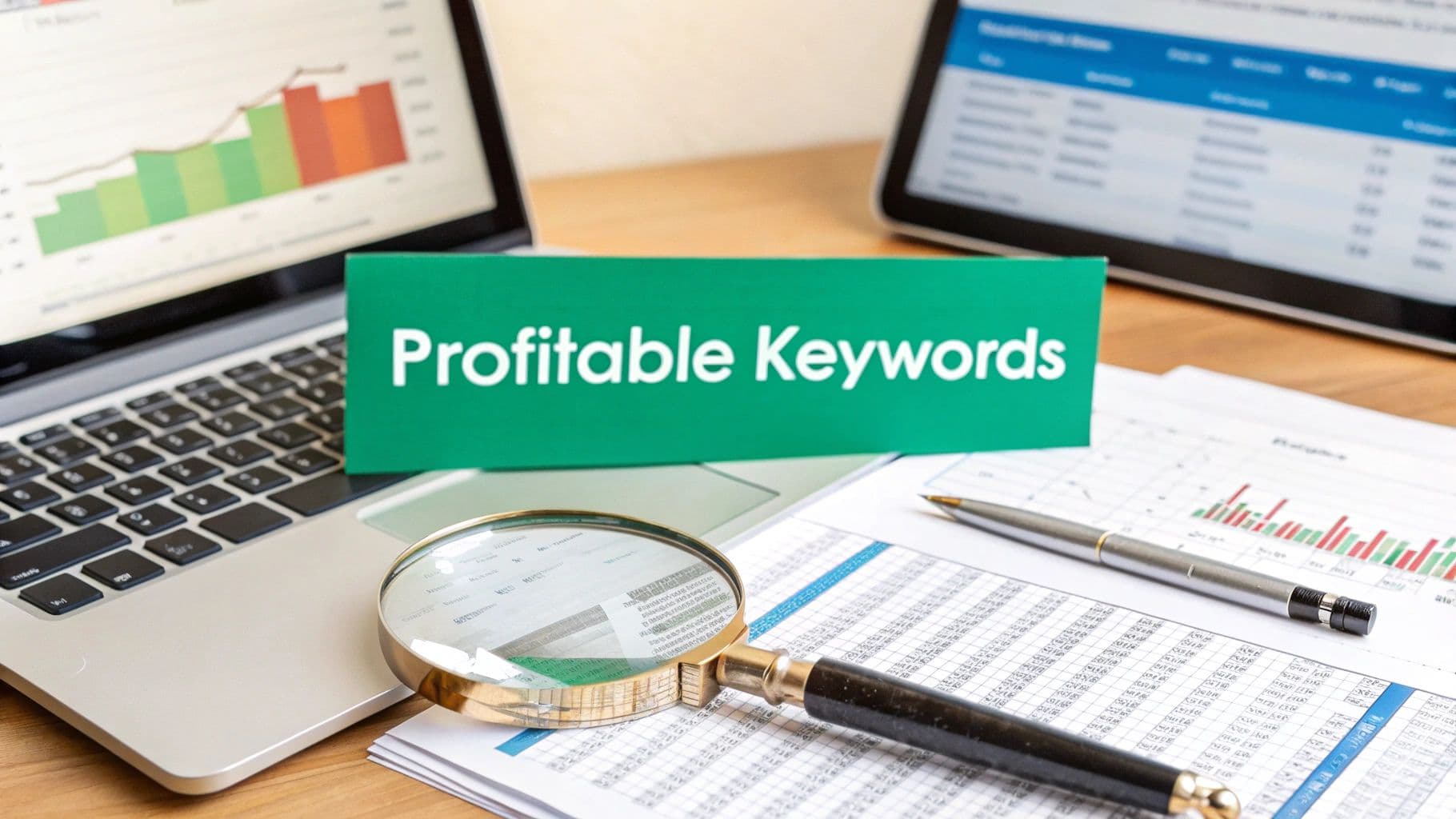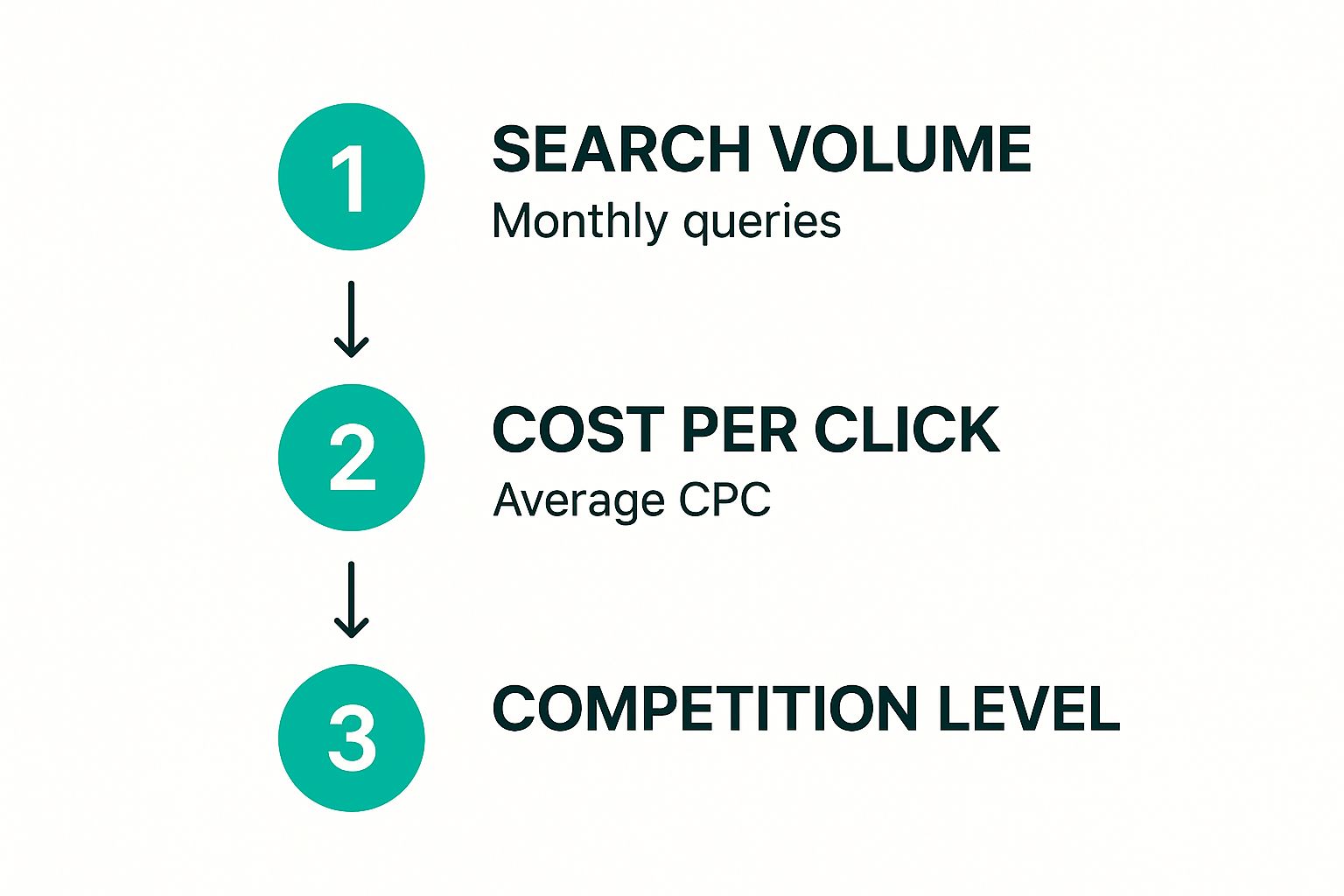
Look, if you want to find keywords that actually make you money, you need a laser focus on three things: commercial search intent, low-competition gaps, and real-world business value. Stop chasing those high-volume, ego-boosting terms. The real goal is to get the right people to your site, not just more people.
Why Your Keyword Strategy Isn't Making You Money
Does this sound familiar? You spend ages buried in keyword tools, pull together a list, and start ranking for a few terms. Your traffic numbers go up, and it feels great... until you realize none of those new visitors are buying anything. You're left with a pretty analytics graph but no extra cash in the bank.
This is a classic trap, and it stems from a simple but critical mistake: confusing website traffic with business growth.
Everything clicks into place once you change the question you're asking. Forget "How do I get more traffic?" Instead, ask, "How do I find the people who are ready to pull out their wallets?" That single shift is what turns your keyword research from a chore into a profit-generating machine.
Ditching Vanity for Profit
Big search numbers are tempting, but they're usually a mirage. Broad, popular keywords attract everyone and their dog, and most of them are just window shopping. This is where truly understanding search intent becomes your secret weapon.
A keyword's real worth has nothing to do with its search volume. It's all about the intent behind the search. One person searching "buy emergency plumbing service" is worth a hundred people searching "how does a faucet work."
Think about it: recent data shows that over 52% of all Google searches are purely informational. People are just looking for answers, not solutions to buy. The real money is in the less frequent, but super-specific, commercial and transactional searches.
What’s more, long-tail keywords—those super-specific phrases of 10-15 words—get 1.76 times more clicks than single-word terms. This just proves that the more specific the search, the more motivated the searcher. If you want to dive deeper, you can check out more 2025 SEO statistics that back this up.
This is why you have to dig past the obvious keywords. You're on a treasure hunt for the exact phrases that signal someone is ready to make a move. It's always about quality, never just quantity.
Putting on Your Detective Hat to Find Seed Keywords

Before you ever open a keyword research tool, you need to understand what makes your audience tick. The best keywords don't come from a spreadsheet; they come from real human conversations, questions, and frustrations. This first step is all about doing a little detective work.
Your goal is simple: find the raw, unfiltered language your potential customers use every day. Forget all the polished marketing speak for a minute. It's time to become a fly on the wall where your audience spends their time online.
Eavesdrop (Ethically!) on Your Audience
First, figure out where your ideal customers hang out online. These communities are absolute goldmines for uncovering their biggest pain points and, more importantly, the exact words they use to talk about them.
- Reddit Threads: Dive into subreddits related to what you do. Think r/smallbusiness or r/skincareaddiction. Hunt for posts that start with "How do I…?", "What's the best…?", or "I'm struggling with…". The comment sections are often where the real magic happens.
- Facebook Groups: Get into private groups centered around your niche. You’ll see members sharing their challenges and asking for honest recommendations, giving you a direct peek into their mindset.
- Industry Forums: Don't sleep on old-school forums. These places are often filled with dedicated experts and die-hard enthusiasts. The language here can get super specific, which is perfect for uncovering valuable long-tail keywords.
This isn't just about finding topics. It’s about grabbing the exact phrases people use. A potential customer probably isn't searching for "B2B lead generation software." They're more likely asking something like, "How do I find more clients for my agency?"
Look for Clues in Your Own Backyard
Sometimes, the best clues are hiding in plain sight—right within your own company data. Your internal communications are a treasure trove of keyword ideas coming straight from the people who matter most.
Dig into your customer support tickets, listen to sales call recordings, and read through live chat transcripts. What questions keep coming up over and over? What specific problems are people trying to fix with your product? These are the seed keywords your competitors are probably missing.
Taking this people-first approach means your entire SEO strategy will be grounded in what your audience actually needs, not just what a tool spits out. This is how you find the starting points that lead to real growth.
Finding Low-Competition Keywords Your Competitors Missed

Trying to battle industry giants for the most obvious keywords is a losing game. It’s an expensive, slow grind that rarely pays off. The real magic happens when you uncover the low-competition “golden nuggets” that your bigger competitors have decided are too small to bother with.
This is where you can find your strategic edge. It's not about chasing massive search volumes; it's about spotting opportunities where you can actually win. These keywords still have good search demand, but they aren't swamped with competition, giving you a clear path to rank and attract valuable traffic. While hitting the front page for a major term can take forever, these less-contested phrases are your ticket to getting seen much faster. For a fantastic deep-dive on this, check out ProductiveBlogging's guide on finding low-competition keywords.
Look Beyond the Keyword Difficulty Score
Most SEO tools give you a Keyword Difficulty (KD) score, and while it's a decent starting point, it's not the whole story. I've seen countless marketers make the mistake of stopping there. The real opportunities pop up when you roll up your sleeves and manually check out the search results page (SERP).
Don't just look at the top domains. Pay close attention to what is actually ranking. Are you seeing old, crusty blog posts? Or maybe a few Reddit and Quora threads creeping onto page one? These are tell-tale signs of weakness.
When I see a low-authority site, a Quora thread, or a five-year-old blog post in the top five results, it’s a massive green light. It’s basically Google telling you it's looking for something better, and you can be the one to give it to them.
Spotting Your Strategic Advantage
As you’re digging through the SERPs, keep an eye out for these classic signs of a winnable keyword:
- Low-Authority Sites: Get a browser extension that shows Domain Authority (DA) or Domain Rating (DR). If the top results are dominated by sites with weak authority scores, you’ve got a real shot.
- Thin or Outdated Content: Click on the links. Is the content super short, poorly written, or talking about things from years ago? That's your cue to create a more comprehensive, modern piece of content that blows it out of the water.
- User-Generated Content: Forum posts and Q&A sites on page one are a gift. It means there’s a serious lack of expert, well-crafted content for that search query. Your in-depth article can easily take that spot.
By focusing on these gaps, you can rack up some quick SEO wins and build a reliable flow of traffic that's ready to convert—all without needing a huge budget.
How to Tell if a Keyword Will Actually Make You Money

Alright, so you’ve got a list of potential keywords. Some look like solid bets, and you might have even unearthed a few low-competition gems. But here's where the rubber meets the road: you have to figure out if these keywords can actually drive revenue.
A keyword is only worth your time if it leads to commercial action. This is the step where you sift through your list and pinpoint the terms that will genuinely grow your business. It's about moving past simple search volume and looking for real financial signals.
A great way to do this? See what other businesses are paying for. If companies are consistently spending their hard-earned cash on a keyword, you can bet it's because that traffic converts.
Use Paid Search Data as Your Guide
The Cost-Per-Click (CPC) is your inside look into a keyword's commercial value. Think of it this way: a high CPC means companies are in a bidding war because those clicks are leading directly to sales. You don't even need to run a single ad yourself to get this intel. Tools like RankHub will show you the CPC for your target keywords, giving you a clear window into their profit potential.
This paid data is a big deal. On average, businesses make around $8 in profit for every $1 they spend on Google Ads. That's a huge return, and it all starts with picking the right keywords. If you want to dive deeper into these numbers, Semrush has some great Google search statistics worth checking out.
A keyword with a $10 CPC is sending a much stronger commercial signal than one with a $0.50 CPC. It tells you that businesses have done the math and confirmed that traffic from that search query is highly profitable.
Read the SERP for Purchase-Ready Clues
Beyond the CPC data, you need to get your hands dirty and actually look at the search engine results page (SERP). This manual check gives you the kind of context that raw numbers just can't provide.
When you Google your keyword, look for these tell-tale signs of transactional intent:
- "Money" Words: Do the search queries include terms like "buy," "pricing," "alternative," "review," or "service"? These are what I call "buyer modifiers," and they signal someone is ready to pull out their wallet.
- A Sky Full of Ads: If the top of the page is packed with Google Shopping results and text ads, it’s a dead giveaway that the keyword has high commercial intent.
- What's Ranking Organically: Take a look at the top organic results. Are they mostly product pages, pricing tables, and "best of" comparison articles? That’s Google telling you it knows searchers are looking to buy, not just learn.
Turning Your Keyword List Into a Real Content Plan
So, you’ve done the hard work and unearthed some fantastic keywords. That’s great, but it’s only half the story. A brilliant keyword list sitting in a spreadsheet won't do you any good. Now it’s time to turn that raw data into a living, breathing content roadmap that actually builds your site's authority and brings in business.
The biggest mistake I see people make is tackling keywords one by one. You have to start thinking bigger. The key is to group related keywords into logical topic clusters. Think of these as little families of search terms that all circle around one core, valuable theme.
For example, if you run a site about homebrewing, you wouldn't just write about "how to brew beer." You'd cluster keywords like "best homebrew starter kits," "homebrew sanitization tips," and "how to bottle homebrew" all under that main topic.
This is the secret to building topical authority, which is exactly what Google wants to see.

As you can see from this flow, it's all about finding that sweet spot. You need to balance search volume with real commercial signals (like CPC) and find topics where the competition isn't impossible to beat.
Deciding What to Write First
Okay, you've got your clusters. Now, where do you start? I’m a big fan of the "Pillar and Spoke" model. It’s simple, effective, and search engines love it.
Your main, broad topic becomes your pillar page. This is your definitive, comprehensive guide on the subject. Using our homebrewing example, this would be your "Ultimate Guide to Homebrewing Beer."
Then, all those more specific, long-tail keywords in your cluster become the supporting spoke articles. These are shorter, laser-focused posts that explore a single subtopic in detail, like a post specifically on "choosing the right yeast." Critically, each spoke article links back to your main pillar page, creating a clean, organized site structure that’s a win for both your readers and SEO.
A little pro-tip from my own experience: I always go after clusters that have high commercial intent (a healthy CPC is a good sign), decent search volume, and a competition level I know I can realistically crack. This way, every article I publish has a clear purpose and a direct line to making an impact.
When you're mapping this out on a content calendar, try scoring each topic cluster on three simple things:
- Profit Potential: What’s the commercial intent look like? Is the CPC telling you people are willing to pay for this traffic?
- Ranking Difficulty: Can you actually get on page one, or is it dominated by giants? Be honest with yourself here.
- Effort Required: How much time, research, and resources will it take to create something truly great?
This quick scoring system helps you move beyond just data and focus your energy where it matters most. It’s how you turn a simple list of keywords into a strategic plan for growth.
Common Questions About Finding Profitable Keywords
Even when you feel like you have a great system down, keyword research can still throw you a few curveballs. It's totally normal. Let's walk through some of the questions I hear all the time so you can get past those sticking points and feel more confident in your strategy.
How Do I Know if a Keyword Is Really Low-Competition?
A Keyword Difficulty (KD) score from a tool is a starting point, not the final word. To get the real story, you absolutely have to roll up your sleeves and manually check out the search results page (SERP).
What you're looking for are signs of weakness on page one. Are user-generated content sites like Quora or Reddit hanging out in the top spots? Are the ranking pages from sites with pretty low Domain Authority? Or maybe the content itself is just thin, outdated, or not very helpful. Spotting a couple of these clues is a fantastic sign that you've found a winnable keyword, even if the KD score looks a little intimidating.
What Is a Good Cost-Per-Click to Look For?
There’s no magic number here. A "good" CPC in one industry could be terrible in another, so stop looking for a specific dollar amount. Instead, think of CPC as a relative measure of commercial intent.
If one keyword has a CPC of $5 and a very similar one has a CPC of just $0.50, that’s a massive clue. It tells you businesses are willing to pay way more for the first term because it's driving real value and profit. Your goal should be to find keywords with a CPC that's clearly above average for your specific niche.
Can Informational Keywords Actually Be Profitable?
You bet they can. They might not be direct "buy now" searches, but informational keywords are the lifeblood of top-of-funnel marketing. They're a long-term play, but a powerful one.
Think about it: you create the absolute best, most helpful guide that answers someone's burning question. Right away, you’ve built trust and made them aware of your brand. From there, you can strategically use internal links and subtle calls-to-action to guide them toward your products or services when they're ready. You're nurturing future customers before they even know they need you.
Ready to stop guessing and start finding profitable keywords automatically? RankHub analyzes your entire website in under 60 seconds to deliver a prioritized list of high-value opportunities your competitors have missed. Ditch the manual research and discover your next winning keywords.
Article created using Outrank
More from Our Blog
7 Killer Content Strategy Example Ideas to Copy in 2025
Looking for a proven content strategy example? We break down 7 real-world strategies from HubSpot, Red Bull & more to inspire your own plan.
Read more →
Analyze Keyword Competition Like a Pro
Tired of guessing? Learn how to analyze keyword competition with our practical guide. We cover the tools, metrics, and workflows to find winnable keywords.
Read more →
Ecommerce Content Strategy for Ecommerce | Win More Sales
Master your content strategy for ecommerce to boost traffic, engage customers, and increase sales. Learn proven tactics to grow your online store.
Read more →